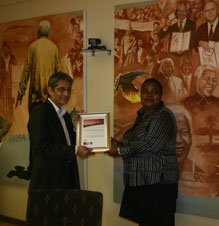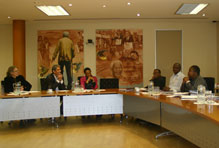
From left: the Foundation’s CEO Achmat Dangor and Dr Audrey Gule, Executive Head of the EMS. The Johannesburg EMS presented the Foundation with a certificate in recognition of the invaluable contribution made by the Foundation during the EMS’s Mandela Day initiative
August 28, 2009 – The Nelson Mandela Foundation’s Centre of Memory and Dialogue met with the City of Johannesburg Emergency Management Services (EMS) today at the Foundation’s offices, to discuss working together for next year’s Mandela Day.
This year on July 20 the EMS and the Foundation joined forces to help the homeless as part of the EMS’s commitment to the Mandela Day initiative.
Achmat Dangor, the Foundation’s CEO, explained the Mandela Day initiative was, in part, created by the need to make Nelson Mandela universally available. The Head of the Memory Programme and the Head of the Dialogue Programme, Verne Harris and Mothomang Diaho respectively, spoke about how pleased they were that South Africa as a whole had by and large understood the message behind the Mandela Day initiative and adopted it.
“There are requests from all over the world for Mr Mandela to intervene in situations,” explained Dangor. “It’s impossible for him to intervene in every situation. In this way we can share him without him being there.”
Dr Audrey Gule, Executive Head of the EMS, said that Mandela Day had provided EMS with the “opportunity to strengthen partnerships with communities”.

From left: The Nelson Mandela Foundation’s Head of Memory Verne Harris; CEO Achmat Dangor; Head of Dialogue Mothomang Diaho; the City of Johannesburg Emergency Management Services’ Ratshipane Legoete, chief chaplain; Media Liaison Officer Percy Morokane and Dr Audrey Gule, Executive Head of the EMS
Gule explained that for emergency services to be at their most effective they required the involvement of the community. Mandela Day had provided the opportunity to move uniformed staff, often viewed with suspicion by communities, into those areas to become part of those communities. The aim, she said, was to capitalise on that momentum of goodwill to further foster relationships between the emergency services staff and members of local communities.
“This year we’re focusing on people who live on the streets and beggars, and on ways to enable them to find their way off the street,” Gule said.
Ratshipane Legoete, chief chaplain of EMS, added that when civil servants try to remove people from the streets they are often viewed with suspicion.
“People’s perception is that being removed from the street is a punishment. We used the Mandela Day initiative to show a caring aspect, that the people in uniforms are a good thing.”
The EMS team, consisting of Gule, Legoete and Media Liaison Officer Percy Morokane, and the team from the Foundation agreed that they should work together to facilitate programmes that enhanced social cohesion in the Johannesburg area.
The upcoming 2010 Fifa Soccer World Cup was something they felt could add momentum and impetus to next year’s Mandela Day.
It was agreed that the City of Johannesburg and the Nelson Mandela Foundation would continue to speak to one another and would look to include the Nelson Mandela Children’s Fund in future discussions.
After the meeting the Johannesburg EMS presented the Foundation with a certificate in recognition of the invaluable contribution made by the Foundation during the EMS’s Mandela Day initiative.